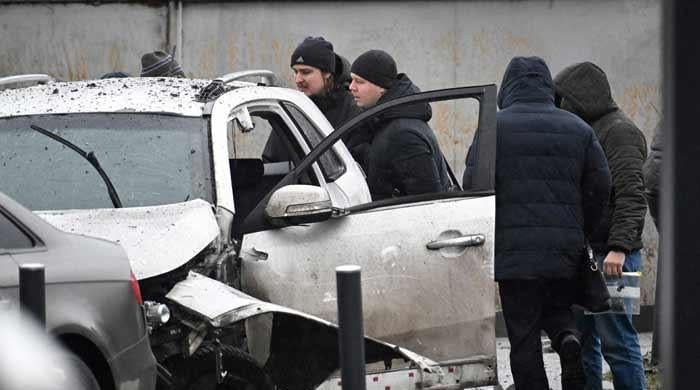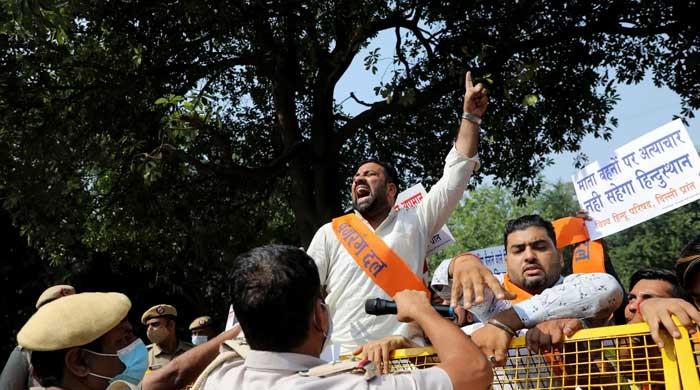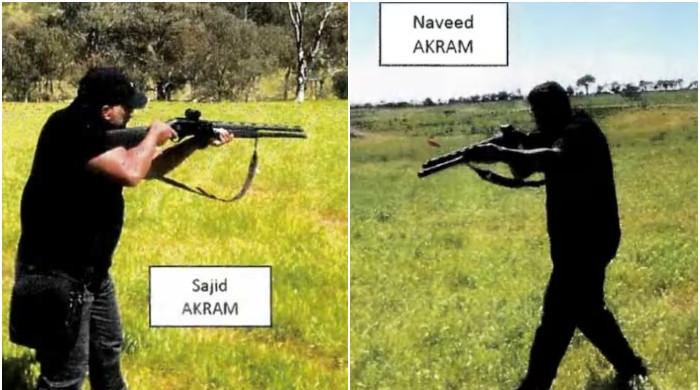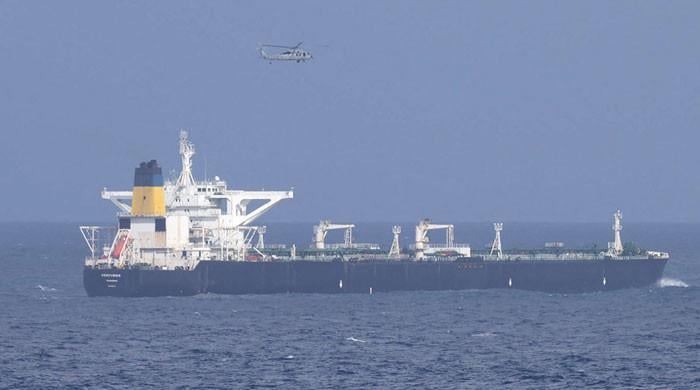Clashes as Greta Thunberg joins anti-coal activists to save German village
Germany, as one of the biggest polluters in the world, has an enormous responsibility, says Greta Thunberg
January 14, 2023

LUETZERATH: Climate activist Greta Thunberg condemned moves to demolish a German village to make way for a coal mine expansion as police clashed with demonstrators at the site on Saturday.
Crowds of activists marched on the hamlet of Luetzerath in western Germany, waving banners, chanting, and accompanied by a brass band.
On the sidelines, there were tense standoffs and scuffles in the pouring rain, between some protesters and police.
Luetzerath — deserted for some time by its original inhabitants — is being razed to make way for the extension of the adjacent open-cast coal mine, one of the largest in Europe, operated by energy firm RWE.
Thunberg marched at the front of a procession of demonstrators who converged on the village, showing support for activists occupying it in protest.
“That the German government is making deals and compromises with fossil fuel companies such as RWE, is shameful,” she said from a podium.
“Germany, as one of the biggest polluters in the world, has an enormous responsibility,” she added.
AFP saw some protesters clash with police trying to move the march away from Luetzerath, which has been fenced off.
Local media reported stones being thrown at police and one protester was seen with a head injury, as ambulance sirens sounded near the protest site.
Police said activists had smashed protective barriers near the huge coal mine and entered the mine site.
“The police barriers have been broken,” the police tweeted. “To the people in front of Luetzerath: get out of this area immediately.”
“Some people have entered the mine. Move away from the danger zone immediately!”
Final stages of evacuation
In an operation launched earlier this week, hundreds of police have been removing activists from the hamlet.
In just a few days, a large part of the protesters’ camp has been cleared by police, and its occupants evacuated.
German press, quoting the police, reported that around 470 activists had been removed from the village since the beginning of the evacuation.
But between 20 and 40 were still holed up in the contested village late Friday, a spokeswoman for the protest movement said. Officials said they were entering the final stages of evacuating the activists.
Demolition works were progressing slowly on those buildings that had been emptied while surrounding trees had been felled as part of the clearance.
The village has become a symbol of resistance to fossil fuels.
Energy crisis
Police reinforcements have come from across the country to participate in the forced evacuation.
Meanwhile, AFP saw protesters arriving in buses, holding banners with slogans including “Stop coal” and “Luetzerath lives!”
Organisers said 35,000 people attended the demonstration.
In the village, many of the activists have built structures high up in the trees, while others have climbed to the top of abandoned buildings and barns.
Activists said they had also dug a tunnel under the hamlet in a bid to complicate the evacuation effort.
The movement has been supported by protest actions across Germany. On Friday, masked activists set fire to bins and painted slogans on the offices of the Greens in Berlin.
The party — part of Germany’s ruling coalition with Chancellor Olaf Scholz’s Social Democrats and the liberal FDP — has come under heavy criticism from activists who accuse it of betrayal.
Following the energy crisis set off by the Russian invasion of Ukraine, the government has brought old coal power plants back online.
Officials also signed a compromise deal with RWE that made way for the demolition of Luetzerath but spared five nearby villages.
The energy firm also agreed to stop producing electricity with coal in western Germany by 2030, eight years earlier than previously planned.
Chancellor Scholz on Saturday inaugurated a Liquefied Natural Gas (LNG) terminal at the northern port of Lubmin, on the Baltic coast.
The plant is another part of the German plan to compensate for the loss of Russian gas imports.
Germany has stepped up its imports of LNG from Belgian, Dutch and French ports since Russia cut off its gas imports in response to western sanctions.









